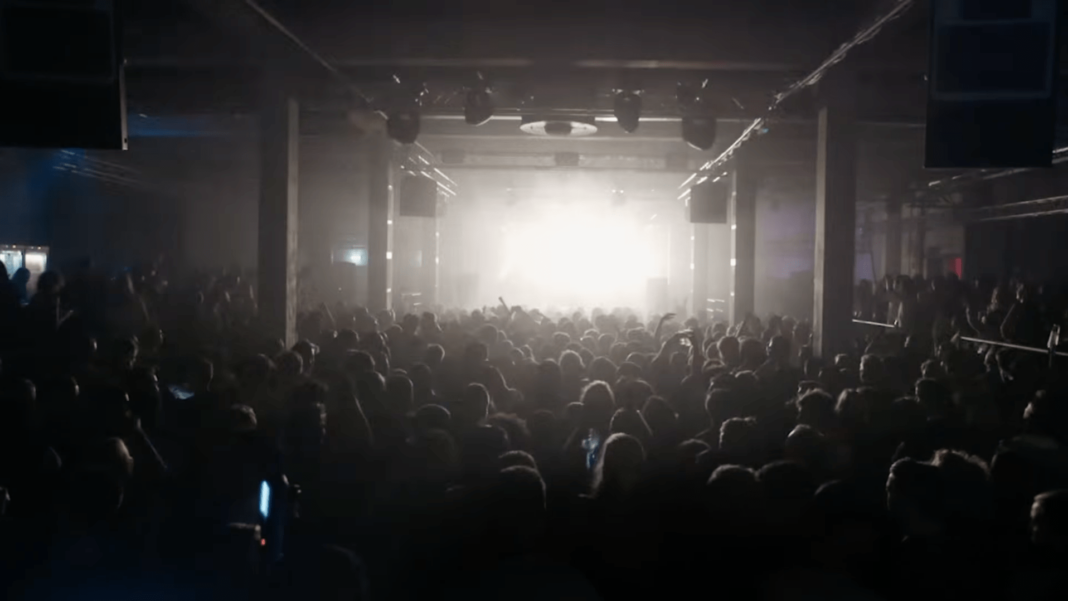The film contains monologue-like, long-running interview sections with electronic musicians from Germany/Switzerland with parallel editing of club/concert shots. The musicians talk about their personal affiliation to electronic music, sound, sound-machines, and the history of electronic music from their personal perspectives.
Roman Flügel mentions that he’s playing in the clubs on the weekends in order to make a living, to be able to spend his time in a studio, and do what he actually loves. I wasn’t aware that for some musicians, DJing is a side hustle to make a living.
Ata dates the history of electronic music in Germany to the 1950s and 1960s, and he argues that the innovations and music also influenced the rise of House music in Detroit. He argues that the black/gay scene in Detroit was aware of the music in Germany and was also influenced by it.
Villalobos finds a power in electronic music they make which gathers together the people in a highly atomized world with a lowest common denominator: love of the music. He points that as the main reason he’s making music.
The interviewees
- Ata
- Ata is a DJ and founder of the labels Playhouse, Klang, Ongaku. He also runs the 250-capacity Robert Johnson club in Offenbach, Frankfurt-Am-Main.
- Beside DJing, Ata founded the first ‘real’ clubnight in Frankfurt for modern house and deep house, the Wild Pitch Club at the Nachtleben-Club. After years of parties he closed the concept and opened the Robert-Johnson 1999. Through the DJ he has booked, his own DJ sets and the club itself, he made the Robert-Johnson to one of the most important clubs worldwide for electronic music.
- Roman Flügel
- German producer, DJ and live act in the electronic music scene. Since the 1990s, Roman Flügel has appeared as a producer under various pseudonyms such as Eight Miles High, Roman IV, Ro 70 and Soylent Green.
- Together with Jörn Elling Wuttke he has released music under the aliases Alter Ego, Acid Jesus, Holy Garage and Sensorama. He has also worked with well-known artists such as Ricardo Villalobos worked together and made a name for themselves in the electronic music scene through cross-genre music productions. Since 2009 he has mainly appeared under his birth name.
- Sonja Moonear
- Sonja Moonear has been playing the piano since she was a child and later became active as a DJ and organizer in the canton of Geneva. From 2002 she was a resident at Club Weetamix . Here she was discovered by DJ Zip from the Perlon label . International appearances followed, including at festivals such as Sonus , Melt , Tomorrowland, Nachtdigital and Time Warp, as well as appearances with Cocoon in Ibiza.
- David Moufang
- German ambient techno musician. He records with his partner, Jonas Grossmann as Deep Space Network project and his solo releases as Move D. His other projects include Earth to Infinity, Reagenz, Koolfang, and Conjoint.
- Moufang’s early influences were space, technology, and, of course, music. After becoming proficient in percussion and guitar, he ventured into the world of early electronic music. In 1989, he was introduced to techno; he spent time in clubs that played ambient techno, and before too long ventured out into production and mixing.
- Ricardo Villalobos
- Villalobos was born in the capital of Chile, Santiago, in the year 1970. However, at the age of three he moved to Germany with his family after General Augusto Pinochet overthrew the socialist government of Salvador Allende in 1973.
- He is well known for his work in the minimal techno and microhouse genres, and is one of the most significant figures in the minimal techno scene.
- Villalobos takes much of his inspiration from Depeche Mode, as well as other artists such as Daniel Miller, Thomas Melchior, Baby Ford, Daniel Bell and Andrew Weatherall. He has also taken inspiration from rhythmic South American music.
- In 2006 Villalobos, along with Richie Hawtin and Luciano, played to around 300,000 people at the Berlin Loveparade.
